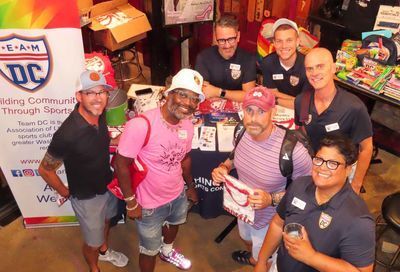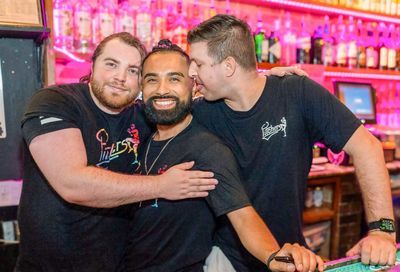Human Rights Campaign issues report on anti-trans violence as U.S. deaths reach record high
Report's release coincides with Transgender Day of Remembrance and new FBI data showing rise in anti-trans hate crimes

The Human Rights Campaign Foundation, the educational arm of the nation’s largest LGBTQ rights organization, has released a report examining violence directed against members of the transgender and gender-nonconforming community.
It comes as the death toll in the United States resulting from such violence reaches a record level, with at least 37 transgender or gender-nonconforming individuals killed in 2020, surpassing the previous high of 31 individuals who were killed in 2017.
More than 200 transgender and gender-nonconforming individuals have been killed since 2013, when the Human Rights Campaign began tracking the numbers for U.S. deaths, and at least 350 known transgender individuals have been killed across the globe this year.
HRC’s report, “An Epidemic of Violence: Fatal Violence Against Transgender and Gender Non-Conforming People in the United States in 2020,” details the deaths of those individuals killed in the United States, including updates on the status of investigations into their deaths, or any charges filed against perpetrators of violence.
The report drops just a day before the annual Transgender Day of Remembrance, an international day meant to commemorate the lives of those trans individuals who lost their lives to violence.
“This year, we reached two grim milestones — the Human Rights Campaign has recorded the most deaths of transgender and gender non-conforming people of any year since we began tracking this violence, and we have documented more than 200 total deaths,” HRC President Alphonso David said in a statement.
“Every life that we have lost this year and every year had value and did not deserve to be cut short,” David added. “Divisive and dehumanizing rhetoric from anti-equality political leaders has contributed to the toxic mix of racism, sexism and transphobia that drives this horrific violence. It’s on all of us to fight for change at every level and take action to support trans and gender-nonconforming people. We must work to dismantle the stigma that so many in the trans and gender-nonconforming community face, and bring this violence to an end.”
Although there are many factors that contribute to anti-trans violence, including stigma and outright prejudice, other factors, such as employment discrimination, exclusion from health care, poverty, homelessness, and other factors can exacerbate the problem by putting trans individuals at greater risk of victimization. These other factors themselves can be exacerbated by racism or sexism.
Related: HRC Foundation launches PSA campaign to combat anti-trans stigma and violence
According to the report, most of the U.S. transgender or gender-nonconforming victims killed since January 2013 have been under the age of 35, with the overwhelming majority of them being Black transgender women. More than two-thirds of all murders involved a firearm of some type.
In 2020, approximately seven in 10 transgender and gender-nonconforming people were killed by an acquaintance, friend, family member or intimate partner. Of all known trans murders since 2013, the relationship of the victim to their assailant is unknown in 30% of all cases, meaning that anywhere from 44% to 74% of victims were killed by someone they knew personally.
HRC’s report details how many trans victims of violence are initially misgendered in police reports or in media coverage. If that misgendering is never corrected, it can lead to undercounting the total number of trans murder victims.
According to HRC, about three-quarters of all known trans or gender-nonconforming victims were initially misgendered by law enforcement, media, or both.
“These victims, like all of us, were loving partners, parents, family members, friends and community members,” Tori Cooper, HRC’s director of community engagement for its Transgender Justice Initiative, said in a statement. “They worked, went to school and attended houses of worship. They were real people — people who did not deserve to have their lives taken from them. As we work to ensure that they are remembered with dignity in death, we will also continue to uplift the resilience and humanity of the entire transgender and non-binary community.”
The report’s release also coincides with recently released data on hate crimes from the Federal Bureau of Investigation. That data, from 2019 shows that there was an uptick in crimes where a victim was targeted because of their gender identity.
However, because reporting hate crimes to the FBI is not mandatory, even the FBI’s estimates may be undercounting the frequency of such violent incidents.
HRC’s report also examines the few existing legal recourses or protections for transgender and gender-nonconforming people, including the Violence Against Women Act, the Matthew Shepard & James Byrd Jr. Hate Crimes Prevention Act, and the Supreme Court’s recent finding in a case involving employment law, in which anti-transgender discrimination has been found to be a form of sex-based discrimination.
The report lays out federal and state actions that could be taken to provide additional protections, as well as individual actions that people can take to combat anti-transgender prejudice or stigma.
Last month, HRC President Alphonso David and Minneapolis City Council Vice President Andrea Jenkins launched a “Pledge to End Violence Against Black and Brown Transgender Women” as part of HRC’s Transgender Justice Initiative.
The pledge asks state and local elected leaders to acknowledge the epidemic of anti-transgender violence, particularly its effects on Black and Brown transgender women, and to promise to take decisive steps on policies that will help save lives. Similar actions could also potentially be taken at the federal level under a Joe Biden presidency.
Aware of this, activists have shared HRC’s “Blueprint for Positive Change,” an important brief outlining 85 policy recommendations that could be enacted to better reduce the risk of violence posed to trans individuals.
For more information on HRC’s transgender initiatives, visit www.hrc.org/transgender.
Read more:
Trump supporter yells “f**k all you f****ts” during MAGA march in DC
Trump supporter files restraining order over LGBTQ chalk art outside his home
European Union reveals plan to tackle rising anti-LGBTQ discrimination
Support Metro Weekly’s Journalism
These are challenging times for news organizations. And yet it’s crucial we stay active and provide vital resources and information to both our local readers and the world. So won’t you please take a moment and consider supporting Metro Weekly with a membership? For as little as $5 a month, you can help ensure Metro Weekly magazine and MetroWeekly.com remain free, viable resources as we provide the best, most diverse, culturally-resonant LGBTQ coverage in both the D.C. region and around the world. Memberships come with exclusive perks and discounts, your own personal digital delivery of each week’s magazine (and an archive), access to our Member's Lounge when it launches this fall, and exclusive members-only items like Metro Weekly Membership Mugs and Tote Bags! Check out all our membership levels here and please join us today!




























You must be logged in to post a comment.